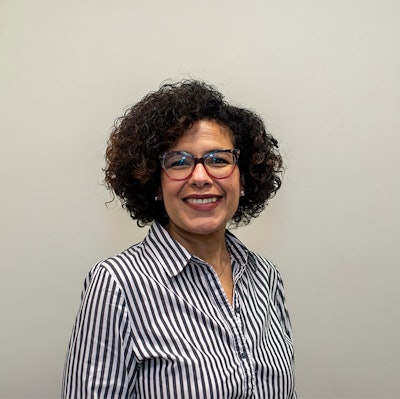The events of 2020 are still resonating. A life-threatening pandemic, disproportionately impacting communities of color and low-income families, and the deaths of Ahmaud Arbery, Breonna Taylor, and George Floyd became catalysts for a summer of protests, crystallizing the renewed call for racial justice in America.
 Dr. Brooke Vick, chief diversity officer, associate provost for equity and inclusion, and coordinator of the new DEI certificate program at Muhlenberg College.
Dr. Brooke Vick, chief diversity officer, associate provost for equity and inclusion, and coordinator of the new DEI certificate program at Muhlenberg College.
That work wasn’t going to be easy.
“Many realized they did not yet have the capacity, understanding, or skills to implement necessary changes or identify what those changes might be,” said Vick.
Through conversations with community partners, Vick said Muhlenberg College administration came to realize they could help. Starting in the 2023 – 2024 academic year, students can now enroll in Muhlenberg College’s Graduate Certificate program in Diversity, Equity and Inclusion (DEI). The multidisciplinary program will blend “theory, research, and practice, to prepare students to lead their organizations through this critical time of social progress,” said Vick, who will coordinate the program.
The course will take one year, wherein students will attend two in-person symposiums and take courses virtually, synchronously and asynchronously. The goal is to attract a broad audience to the program, said Dr. A.J. Lemheney, vice president and executive director of Muhlenberg’s Division of Graduate and Continuing Education.
“We hope to attract a mix of professionals that will create conversations across industry sectors examining issues of equity and inclusion in their workplaces and communities,” said Lemheney.
Muhlenberg’s new program joins a growing number of DEI certificate and degree programs offered by businesses and, increasingly, institutions of higher education, experts said. As the U.S. Supreme Court continues its deliberations over the use of race as one of many holistic admissions assessments, DEI officers and training can offer a crucial connecting point to understand how race is woven into the lived experiences of students, faculty and staff, both on and off campus.
“It’s important for students, faculty, staff and peers to understand that in order to create a sense of inclusion, one has to feel they are welcome, respected, and their presence is important, to not only their success, but for the success of others as well,” said Paulette Granberry Russell, president of the National Association of Diversity Officers in Higher Education (NADOHE). “Working, living, and learning in an environment that appears unwelcoming, that is where you experience bias and discrimination that impacts your sense of belonging, like, folks don’t want me here.”
 Paulette Granberry Russell, president of the National Association of Diversity Officers in Higher Education (NADOHE).
Paulette Granberry Russell, president of the National Association of Diversity Officers in Higher Education (NADOHE).
“Not everyone can walk in the door and do this work,” she said. “If you’re functioning at a senior level, it requires mastering a number of skillsets to be effective and successful. We’re impacting people’s lives, and that should never be misunderstood or underestimated.”
Granberry Russell said the number of NADOHE members has grown tremendously since 2020, many accepting inaugural DEI roles at institutions. The colleges and universities that create DEI certificate or degree programs, she said, are recognizing the need for the specialized training it takes to create a fully equitable and welcoming environment.
Dr. Marybeth Gasman, executive director of the Samuel DeWitt Proctor Institute for Leadership, Equity & Justice at Rutgers University in New Brunswick, NJ, said many higher education institutions have built DEI programs to respond to the moment, a way of earning new revenue and attracting a different type of student while sharing unique faculty expertise and resources.
These many DEI programs, Granberry Russell and Gasman agreed, are as different as the institutions that offer them. Some last for days, others for years. Gasman said that successful programs stay up to date and are as hands on as possible, acknowledging that DEI work is never done.
“All of us in higher education, you have to think about these issues every day—be cognitive of who is included and who is not. How are we listening to voices and not? Who gets opportunity and who doesn’t, across students, faculty, and staff,” said Gasman. “It’s like exercise. You’ve got to exercise all the time, otherwise you go back to where you were.”
Muhlenberg’s program is designed to be as accessible as possible to its students, meeting the needs of working professionals, said Lemheney. Their program will lean into Muhlenberg’s liberal arts methodology, allowing for “focus on collaboration, critical analysis, solving socially complicated programs, making connections, emotional intelligence, thinking globally, and valuing cultural diversity,” he said.
For Vick, this program is a chance for the college to develop more engaged students that will positively impact the college and the community around it.
“A critical part of Muhlenberg’s mission is to develop civically-engaged students with an understanding of the diversity of the human experience,” said Vick. “The more opportunities the Muhlenberg community has to deepen its understanding of the system, structures, and behaviors that sustain inequality and build skill to promote authentic inclusion and diversity, the better equipped we will be to deliver on those commitments.”
Liann Herder can be reached at [email protected].






















